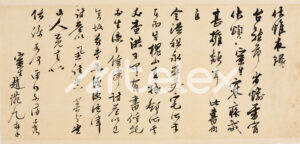Cho Wan-gu (1881–1954) was a prominent Korean independence activist.
In 1989, he was posthumously awarded the Order of Merit for National Foundation, Presidential Medal.
After the signing of the Eulsa Treaty in 1905, Cho was deeply influenced by the self-immolation of Min Yeong-hwan, a high-ranking official who protested the treaty, leading Cho to fully commit himself to the anti-Japanese independence movement.
He became affiliated with the Daesoon religion (Daejonggyo) and began his earnest involvement in independence activities. Moving to Manchuria, Cho joined the Korean National Assembly and played a pivotal role in the establishment of the Provisional Government of the Republic of Korea in 1919.
Cho was a key figure in the Provisional Government, taking part in diplomatic efforts and serving in internal government roles. A staunch advocate for the preservation of the Korean royal family, he argued for their formal recognition even within the new republican government, though this stance drew criticism from some younger independence activists.
After Korea’s liberation in 1945, Cho returned to his homeland as a member of the Provisional Government and dedicated himself to the cause of national unity. He worked alongside leaders such as Kim Gu and Kim Kyu-sik, advocating for a unified government through dialogue between North and South Korea. However, with the establishment of separate governments on the Korean Peninsula, his efforts for reunification were frustrated.
During the Korean War, Cho was forcibly taken to North Korea, where he lived under house arrest. In 1954, after enduring years of hardship, he passed away in Pyongyang due to illness. His remains were interred in the Patriotic Martyrs’ Cemetery in Pyongyang. Despite his abduction and the challenges he faced, Cho Wan-gu’s legacy as a steadfast leader in Korea’s independence movement remains highly regarded.

